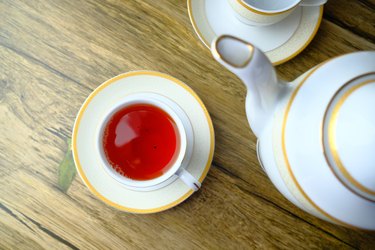
"Keep calm and have a cup of tea." That's usually good advice, because tea provides a wealth of health benefits, and just seems to be inherently soothing. However, too much of a good thing raises the risk of experiencing the side effects of tea, beyond the common jitters from excess caffeine.
Tip
A moderate amount of tea-drinking is unlikely to lead to problems, unless you have a specific sensitivity. Among the potential side effects of drinking tea too much are migraines, digestive upset and bladder irritation.
Video of the Day
Multiplying Migraines
If you're prone to migraines, one of the disadvantages of drinking tea is that it may be giving you more episodes each month than you already experience. That's according to an August 2019 study from the American Journal of Medicine.
This study focused on people with episodic migraines, meaning they have up to 14 days with migraine headaches, each month. For people who fit this criterion, a certain amount of tea, or other caffeinated beverages, may increase the number of headache days each month.
Video of the Day
Does that mean you have to give up drinking tea and coffee to avoid a migraine? Not according to the results of this study, which drew a distinct line between one or two cups a day, versus three or more cups of a caffeinated beverage. If you're splitting your caffeine habit between tea, coffee and soda, you may need to either give one up altogether, or cut back on each of the beverage portions.
Read more: Too Much Caffeine and Lightheadedness
Digestive Side Effects of Tea
The International Foundation for Gastrointestinal Disorders (IFGD), lists diarrhea as one of the potential side effects of drinking too much tea. Caffeine is a natural laxative. A moderate amount might even help you stay regular, but unless you have the proverbial iron stomach, habitually consuming more than three cups a day may cause chronic diarrhea.
It's also possible that you're compounding the disadvantages of drinking tea to excess with the ingredients you add to your regular "cuppa." Sugars and artificial sweeteners are associated with diarrhea in some people, notes the IFGD. Others add milk or cream without realizing they have lactose intolerance, which can also wreak havoc with your digestive system.
On the other end of things, so to speak, you may be experiencing heartburn or some form of indigestion more than once-in-a-while. This, too, has been linked to caffeinated drinks. The Cleveland Clinic notes that caffeine can stimulate stomach acids, resulting in heartburn as soon as 15 minutes after consumption, with the peak onset usually starting about an hour after you've had tea, coffee or caffeinated soda.
Read more: Side Effects of Earl Gray Tea
The Other “Gotta Go” Blues
If you've been needing to urinate more frequently, your tea drinking could be part of the problem. Excessive tea drinking delivers a one-two punch to your bladder. It not only overloads your system with fluid intake; it also adds the potential irritant of caffeine consumption. Unfortunately, a bladder control problem is one of the more common disadvantages of drinking tea.
Most obviously, the more of any kind of fluid you drink, the more often you'll have to pee. As the Mayo Clinic points out, daily total fluid intake is only part of what you should consider when it comes to factoring in your tea breaks. If you have a couple of hearty mugs of tea in one sitting, or combine tea with water and other fluids in a short period of time, you may find yourself running for the bathroom.
In addition, the caffeine itself can act as an irritant to the bladder. While not everybody is susceptible to it, some people need to urinate more frequently after ingesting one or more of certain foods and drinks, including tea. Other substances that can reduce bladder control include soda, coffee, citrus juice, chocolate, tomato-based foods and spicy meals.
It's not always obvious whether your bladder control issues are one of the side effects of tea. If caffeine is one of your prime suspects, substitute water or decaf tea to see if your conditions improve. If the amount of fluid you're taking in is more likely to be the problem, don't drink too much at one time, especially before bedtime.
- Harvard Health Publishing: "Tea - Drink to Your Health?"
- The American Journal of Medicine: "Caffeinated Beverage Intake as a Potential Trigger of Headaches among Migraineurs"
- International Foundation for Gastrointestinal Disorders: "Common Causes of Chronic Diarrhea"
- Cleveland Clinic: "Caffeine - Tips for Breaking the Habit"
- Mayo Clinic: "Bladder Control - Lifestyle Tips"